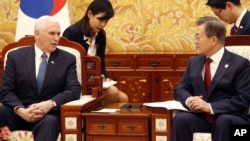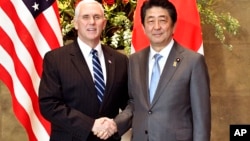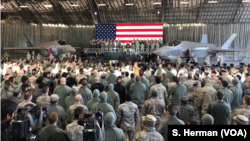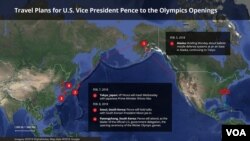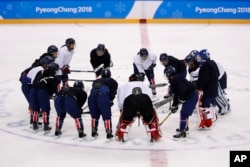U.S. Vice President Mike Pence assured South Korea the United States will stand shoulder to shoulder with its allies to bring “maximum pressure” on North Korea to end its nuclear and ballistic missile program.
Pence arrived in South Korea on Thursday intent on countering North Korea’s Olympic charm offensive in ways that could create a rift with South Korea’s engagement efforts.
“Our resolve to stand with you is unshakable, and we will stand with the people of South Korea and our other allies in the region until we achieve this objective for the peace of your nation, of this peninsula and of the wider world,” Pence said during a joint news conference, adding that the two nations shared the objective of denuclearizing the Korean Peninsula.
“We certainly hope to use this opportunity to the maximum, so that the Winter Olympic Games can become a venue that leads to dialogue for the denuclearization of the Korean Peninsula as well as the establishment of peace on the Korean Peninsula,” South Korean President Moon Jae-in said.
In Japan
In comments earlier in Japan, Pence said the U.S. wants a peaceful solution to the nuclear standoff with North Korea, but is prepared to use force if necessary.
“We are ready for any eventuality. The United States of America will always seek peace. We will ever strive for a better future, but you, the instruments of American power know, and let our adversaries know, all options are on the table,” Pence told to U.S. troops.
The vice president’s emphasis on possible military action follows increased talk in Washington that the administration of President Donald Trump is planning a “bloody nose” military strike in response to the next North Korean provocation.
But in South Korea many officials and analysts discount the threat of U.S. military action against North Korea, because it would put at risk the lives of millions in South Korea and Japan from a likely counterattack.
“All this talk about pre-emptive strikes by the United States is actually part of larger campaign to apply pressure on North Korea,” said Go Myong-Hyun, a North Korea analyst with the Asan Institute for Policy Studies in Seoul.
Maximum pressure
After meeting with Japanese Prime Minister Shinzo Abe in Tokyo on Wednesday, Pence said the U.S. is planning to impose “the toughest and most aggressive round of economic sanctions on North Korea ever,” to pressure the Kim Jong Un government in Pyongyang to give up its nuclear program, including accelerated efforts in the last year to develop a long range nuclear missile that can target the U.S. mainland.
On Thursday he again sounded an uncompromising tone, demanding that North Korea take unilateral action before the U.S. would agree to engage in talks to end sanctions and provide economic assistance and security guarantees.
“We will continue to intensify this maximum pressure campaign on North Korea until it abandons its nuclear and ballistic missile programs once and for all,” Pence said.
Pence will lead the American delegation at the Pyeongchang Winter Olympics in South Korea that begin Friday. The U.S. views North Korea’s Olympic cooperation as an attempt to improve it image and weaken international support for sanctions.
The vice president said he would counter this effort by highlighting the repressive nature of the leadership in Pyongyang. To that end he has invited the father of Otto Warmbier, an American student who died last year after being imprisoned in North Korea for 17 months, to join the Olympic delegation.
Engagement rift
However the U.S. administration’s inflexible approach to North Korea indicates a possible growing rift with the South Korean president’s engagement strategy, despite assurances to the contrary from Washington and Seoul.
“It’s clear that there is already a major split between the two. So far the United States and South Korea’s leaders have been polite about it,” said David Straub, a North Korea analyst with the Sejong Institute in South Korea.
After more than a year of accelerated North Korean ballistic missile and nuclear tests, South Korea’s President Moon helped bring about a pause in provocations by negotiating North Korea’s participation in the Olympics. He also gained U.S. support for postponing joint military exercises until after the Olympics and Paralympics end in late March.
North and South Korea agreed to field a joint women’s ice hockey team for the games and to march together under a unified flag during the opening ceremony. North Korean artists and musicians will also perform during the games at venues in the Pyeongchang region and in Seoul.
For Moon, the increased North Korean cooperation validates his support for greater engagement to peacefully resolve the nuclear crisis on the Korean Peninsula. Moon has said he wants to build upon the Olympic outreach to restart talks with the U.S. to eventually halt North Koreas’ nuclear development program in exchange for economic assistance and security guarantees.
Moon’s approach would require offering concessions, such as a further delay to military drills or increased economic engagement, for a North Korean promise to hold off further weapons tests and agree to pursue denuclearization talks.
Pence’s hard-line stance makes it unlikely that the U.S. would agree to such a deal.
“I think what the U.S. government is doing, is drawing a line in the sand and saying that contrary to South Korean government expectations, the United States is not willing to take this opportunity of the Olympics as a turning point in the current standoff between the United States and North Korea,” said Go with the Asan Institute.
North Korea is sending a high-ranking official delegation to the Olympics that will include the younger sister of leader Kim Jong Un and the North’s nominal head of state, Kim Yong Nam. But Pyongyang indicated it is not interested in meeting with the Pence-led delegation.
Military parade
Also on Thursday North Korea held a relatively low key military parade in Pyongyang, the day before the Olympics are to begin. The annual parade to mark the founding of the North Korean army is usually held in April but was moved to February this year.
North Korean military parades are often seen as a provocative display of military power and ballistic missile technology that is banned under United Nations resolutions.
However official state media in North Korea did not broadcast the parade live, and international news organizations were not invited to cover this event, as they had been for past parades. The South Korean government said Thursday morning that it did not even know what time the parade would begin.
The restrictive coverage of the military parade may indicate Pyongyang wants to keep the world focused on its Olympic participation and renewed inter-Korean cooperation.
Lee Yoon-jee in Seoul contributed to this report.
